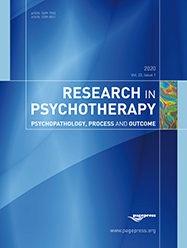Impact of personality traits, coping styles, and anger on psychological symptoms of patients with arterial hypertension
Psychological factors in arterial hypertension
All claims expressed in this article are solely those of the authors and do not necessarily represent those of their affiliated organizations, or those of the publisher, the editors and the reviewers. Any product that may be evaluated in this article or claim that may be made by its manufacturer is not guaranteed or endorsed by the publisher.
Authors
This observational study aimed to investigate the interplay between psychological factors in clinical and non-clinical groups of patients with arterial hypertension. Specifically, the main objectives were: i) to examine associations between personality traits, anger, and psychological symptoms; ii) to explore how coping styles interact with anger in modulating distress; and iii) to compare patients with and without significant psychological distress. One hundred hypertensive patients (mean age 56.04±12.04) were consecutively recruited. Psychological symptoms, anger dimensions, personality traits, and coping strategies were assessed through the Symptom Checklist-90- Revised (SCL-90-R), the State-Trait Anger Expression Inventory-2 (STAXI-2), the 16 Personality Factors Questionnaire (16PF), and the Coping Orientation to Problems Experienced (COPE), respectively. The Global Severity Index (GSI) of the SCL-90-R was used to differentiate a clinical group (T-score≥63) from a non-clinical one. In the overall sample, specific personality traits predicted anxiety, somatization, and paranoid ideation. Symptoms such as psychoticism and hostility were linked to poor anger regulation, and the expression of anger was associated with avoidance-based coping. Patients with higher levels of psychological distress (49% of the patients) were more introverted and emotionally unstable, with symptoms predicted by low liveliness and high rule-consciousness. In contrast, anger expression and control emerged as key modulators of subclinical symptoms even in the non-clinical group (51% of the sample). The integrative and comparative nature of the study described different relationships between personality, anger management, and psychological symptoms between groups of hypertensive patients, divided according to the severity of psychological distress. Additionally, even sub-threshold symptoms proved to be shaped by patterns of emotional regulation, underscoring the need to integrate psychological assessments in the treatment of hypertension.
Supporting Agencies
The research was conducted with a grant for a doctoral project whose scholarship was funded by the Puglia Region - European Social Fund for research in the field of hospital psychology - connection between universities and research institutions in the healthcare system on quality of life and multidisciplinary approach to the treatment system in cardiological rehabilitation.Faculty of Psychotherapy Science, Sigmund Freud University, Vienna, Austria
How to Cite

This work is licensed under a Creative Commons Attribution-NonCommercial 4.0 International License.






